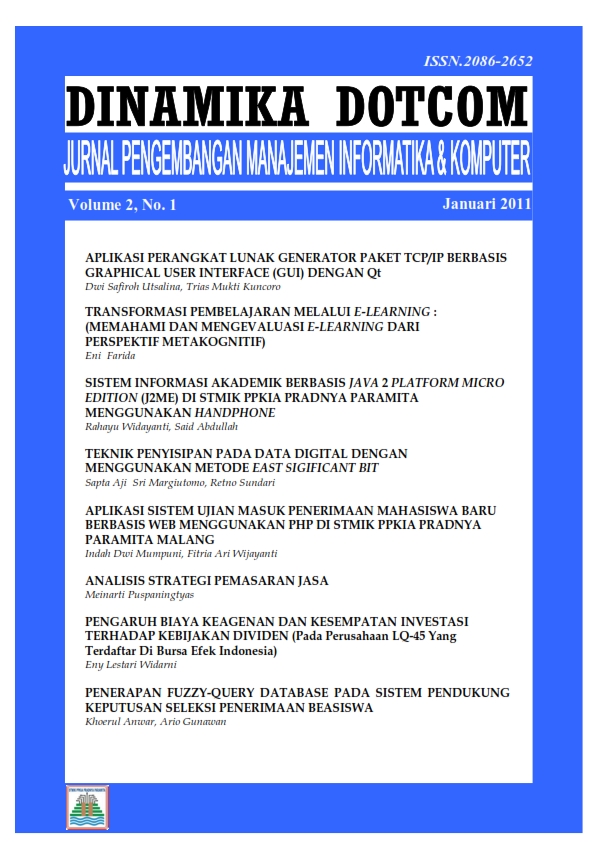TRANSFORMASI PEMBELAJARAN MELALUI E-LEARNING : (MEMAHAMI DAN MENGEVALUASI E-LEARNING DARI PERSPEKTIF METAKOGNITIF)
Abstract
The use of computer and internet technology has been utilized for all aspects of life, legal, social, economic and educational aspects. This led to new learning system known as e-learning, which requires students and teachers interact online through the Internet, independent and creative in the learning process. E-learning system has the main features of the learning process in addition to learning through the Internet network connections, resources and learning materials are always up-to-date and abundant, has the benefits, advantages and benefits compared with traditional learning system. But also have weaknesses, especially for children and adolescents learning system that can be equipped with integrating the concept of traditional learning systems in schools and incorporate elements of independent learning through the internet in a structured way.
Keywords : e-learning, metacognitive perspective
References
Miller, S. M., & Miller, K. M, (2000). Theoretical and practical considerations in the design of web-based instruction. In Abbey, B. (Ed.) Instructional and Cognitive Impacts of Web-Based Education (pp. 156-177). PA: Idea
Nugroho, Warto Adi. (2007). E-Learning VS I-Learning : Penyempitan Makna Elearning dan penggunaan istilah Internet-Learning. www.ilmukomputer.com.
Osman, M. E., & Hannafin, M. J. (1992). Metacognition research and theory: Analysis and implications for instructional design. Educational Technology Research & Development, 40 (2), 83-99.
Permana, hd, (2010), E-learning dalam Proses Belajar Anak dan Remaja, Lembaga Bina Anak dan Pengembangan Masyarakat FEDUs
Simamora, Lamhot. (2003). Cakrawala Pendidikan: E-Learning: Konsep dan Perkembangan Teknologi yang mendukung. Universitas Terbuka. Jakarta.
Sukmadinata, Nana Saodih (2003), Landasan Psikologi Proses Penddikan, PT. Remaja Rosdakarya , Bandung .
Suyanto, Asep Herman (2005), Mengenal E-Learning, Http:/www.asep_hs.web.ugm. ac.id, diakses tanggal 28 Februari 2011, jam 13.25
Soekartawi, (2002). Prospek Pembelajaran Jarak Jauh Melalui Internet. Invited Papers. Disajikan pada Seminar Nasional Teknologi Pendidikan pada tanggal 18-19 Juli 2002 di Jakarta.
Soekartawi, (2002). E-learning, Kampus Virtual Masa Depan, dalam Harian Pelita, 29 Juli 2002.
Soekartawi, (2003). Prinsip dasar E-Learning: Teori dan Aplikasinya di Indonesia. Teknodik.Jakarta.
Tsai, Meng-Jung (2009), The Model of Strategic e-Learning: Understanding and Evaluating Student e-Learning from Metacognitive Perspectives. Educational Technology & Society, 12 (1), 34–48.
___________, Internet Untuk Pendidikan, http://budi.insan.com, 2001.


